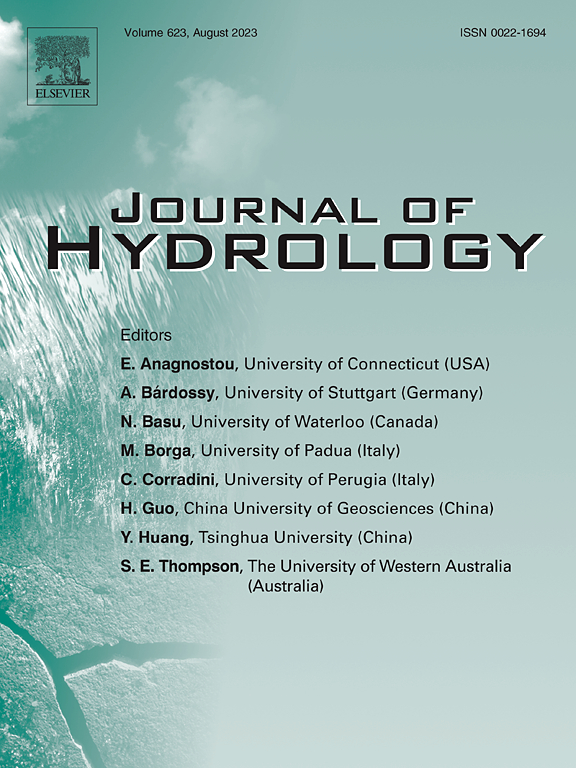具有协方差矩阵自适应的贝叶斯反问题的有效马尔可夫链蒙特卡罗抽样
IF 6.3
1区 地球科学
Q1 ENGINEERING, CIVIL
引用次数: 0
摘要
贝叶斯推理为求解反问题提供了一个有原则的框架,但高维非高斯后验分布的有效采样仍然是传统的马尔可夫链蒙特卡罗(MCMC)方法的挑战。本文介绍了协方差矩阵自适应Metropolis (cmm)算法,这是一种将基于种群的协方差矩阵自适应进化策略(CMA-ES)优化算法与Metropolis采样协同集成的高效MCMC方法。该方法利用多平行链增强贝叶斯反演的勘探能力,并利用CMA-ES的自适应机制动态适应建议分布的方向和规模。解耦的Metropolis接受机制确保了整个适应过程中适当的马尔可夫链构建。该方法进一步结合增强和双重适应策略,利用来自被拒绝样本的信息和双重CMA-ES优化,以提高在多模态和高维场景下的鲁棒性。理论分析证实了该方法的遍历性。数值测试表明,该方法能够对子维链进行采样,同时在反演精度和收敛效率上仍可与最先进的多链自适应MCMC方法相媲美。水文地质案例研究进一步表明,cam可以准确地重建空间非均质电导率场,同时识别污染源位置和释放历史。这些结果突出了cam作为贝叶斯推理在现实世界水文和环境应用中的实用工具。本文章由计算机程序翻译,如有差异,请以英文原文为准。
Efficient Markov chain Monte Carlo sampling for Bayesian inverse problems with covariance matrix adaptation
Bayesian inference provides a principled framework for solving inverse problems, yet efficient sampling of high-dimensional non-Gaussian posterior distributions remains challenging for conventional Markov chain Monte Carlo (MCMC) methods. This study introduces the covariance matrix adaptation Metropolis (CMAM) algorithm, an efficient MCMC approach that synergistically integrates the population-based covariance matrix adaptation evolution strategy (CMA-ES) optimization algorithm with Metropolis sampling. The proposed CMAM employs multiple parallel chains to enhance exploration in Bayesian inversion and leverages the adaptive mechanisms of CMA-ES to dynamically adapt both the direction and scale of proposal distributions. A decoupled Metropolis acceptance mechanism ensures proper Markov chain construction throughout the adaptation process. The method further incorporates augmentation and dual adaptation strategies, utilizing information from rejected samples and dual CMA-ES optimizations, to improve robustness in multimodal and high-dimensional scenarios. Theoretical analysis confirms ergodicity of the proposed method. Numerical benchmarks demonstrate that CMAM is capable of sampling with sub-dimensional chains, while still achieving comparable performance in inversion accuracy and convergence efficiency to state-of-the-art multi-chain adaptive MCMC methods. Hydrogeological case studies further show that CMAM accurately reconstructs spatially heterogeneous conductivity fields and simultaneously identifies contaminant source locations and release histories. These results highlight CMAM as a practical tool for Bayesian inference in real-world hydrological and environmental applications.
求助全文
通过发布文献求助,成功后即可免费获取论文全文。
去求助
来源期刊

Journal of Hydrology
地学-地球科学综合
CiteScore
11.00
自引率
12.50%
发文量
1309
审稿时长
7.5 months
期刊介绍:
The Journal of Hydrology publishes original research papers and comprehensive reviews in all the subfields of the hydrological sciences including water based management and policy issues that impact on economics and society. These comprise, but are not limited to the physical, chemical, biogeochemical, stochastic and systems aspects of surface and groundwater hydrology, hydrometeorology and hydrogeology. Relevant topics incorporating the insights and methodologies of disciplines such as climatology, water resource systems, hydraulics, agrohydrology, geomorphology, soil science, instrumentation and remote sensing, civil and environmental engineering are included. Social science perspectives on hydrological problems such as resource and ecological economics, environmental sociology, psychology and behavioural science, management and policy analysis are also invited. Multi-and interdisciplinary analyses of hydrological problems are within scope. The science published in the Journal of Hydrology is relevant to catchment scales rather than exclusively to a local scale or site.
 求助内容:
求助内容: 应助结果提醒方式:
应助结果提醒方式:


